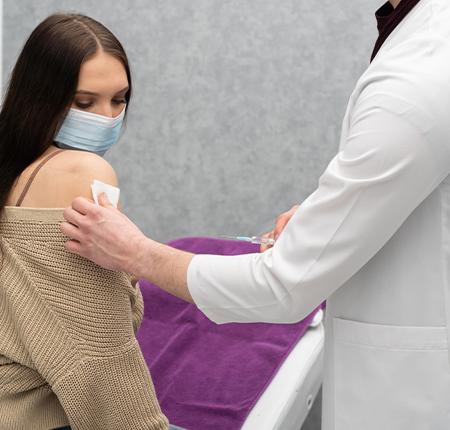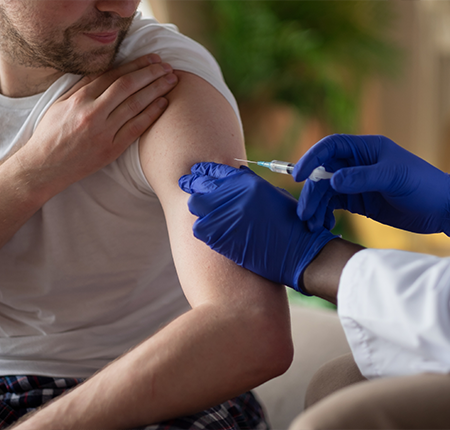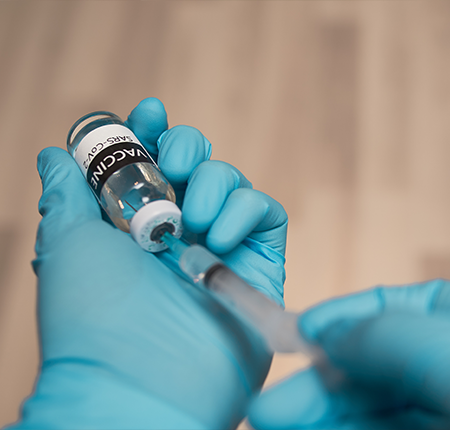
The HPV vaccine is the most effective method of protection against cancer caused by the human papillomavirus. But when should it be done, how many doses do you need and how much does a dose cost? We tell you everything you need to know about the HPV vaccine in Romania.
What is HPV?
HPV, or human papilloma virus, is the name of a group of very common viruses that affect the skin and, in most people, do not cause problems.
But there are more than 100 strains of HPV, and some types can cause genital warts, cancer or other health problems. According to statistics, HPV infection is the most common sexually transmitted infection in people who have an active sexual life, regardless of their age.
If you want to know more about the symptoms of HPV infection and its treatment, you will find a lot of useful information in our article HERE .
How does the HPV vaccine work?
Fortunately, HPV infection can be prevented and there are vaccines that can significantly reduce the chances of infection. They introduce into the body a quantity of proteins similar to those that form the virus, with the aim of stimulating the body to produce antibodies against it and to actively immunize itself. There is no risk of infection from the vaccine, because it does not contain the virus itself.
Although the vaccine does not protect against all types of HPV, it is effective against most strains that cause genital warts, cervical cancer, and other cancers.
One thing to emphasize here is that the vaccine only works preventively! It has no role in treating HPV, so it won't help you get better if you've already been exposed to it. After infection, the vaccine is ineffective and appropriate treatment is needed.
Types of HPV vaccine
There are a total of three types of licensed vaccine: Gardasil, Gardasil 9 and Cervarix. All three protect against HPV types 16 and 18, which cause most cancers. In Romania, the Gardasil 9 vaccine is administered.
Gardasil
Gardasil, also called the quadrivalent HPV vaccine or Gardasil 4vHPV, protects against 4 strains of HPV. Two of these are high-risk strains (16 and 18) that can lead to the development of cancer, and two strains are low-risk, namely 6 and 11 that cause genital warts and warts.
Gardasil 9
The Gardasil 9 vaccine, also called 9-valent or Gardasil 9vHPV, is the one used in Romania and, as the name suggests, protects against 9 strains of HPV. People vaccinated with Gardasil 9vHPV are protected against the two low-risk strains 6 and 11 (against genital warts and warts), and 7 more high-risk strains that can lead to various types of cancer: 16, 18, 31, 33, 45, 52 and 58.
Cervarix
Cervarix, or Cervarix 2vHPV, is the name of the bivalent HPV vaccine that only protects against the two high-risk strains 16 and 18. However, it does not prevent infection with strains 6 and 11, so it does not reduce the risk of transmission of genital warts and warts.
Benefits of HPV vaccination
The main benefit of vaccination against HPV even before the start of sexual life is, of course, the prevention of infection with the strains against which the vaccine is effective. The Gardasil 9vHPV vaccine administered in our country will give you immunity against various types of cancer and will decrease the risk of transmitting genital warts.
The HPV vaccine provides long-term protection against dangerous strains
Effective against high-risk strains, the HPV vaccine protects you long-term against many types of cancer caused by this virus. Some studies claim that the vaccine is effective for at least 10 years and even longer if the vaccination schedule is followed.
HPV vaccine can reduce the risk of cervical cancer by up to 90%
According to UNICEF, HPV vaccines are the most effective way to prevent HPV infection and protect against the strains that cause up to 90% of cervical cancers. This is especially important when cervical cancer kills a woman every 2 minutes.
However, the HPV virus is not the only cause of cervical cancer. For example, prolonged administration of contraceptives can also become a risk factor. So if you want to learn more about what cervical cancer means, how it occurs and how it can be prevented, read the article HERE .
The HPV vaccine also prevents other HPV-related cancers
Especially when we talk about the 9-valent Gardasil vaccine, it reduces the risk of getting vaginal, vulvar, anal or penile cancer caused by HPV. And other organs such as the mouth, throat and head will be protected by vaccination from the types of cancer caused by the human papillomavirus.
The HPV vaccine helps reduce the overall spread of the virus
In addition to protecting you as an individual, the vaccine also helps reduce the spread of the virus in the population. When a large part of the population is vaccinated, people to whom the vaccine cannot be administered are also protected.

Who is the HPV vaccine recommended for?
The anti-HPV vaccine is recommended for young people, but also for sexually active people who are exposed to a higher risk of infection. This category includes, for example, sex workers and people infected with HIV.
Pre-adolescents, adolescents and young adults aged 9 to 26 years
The HPV vaccine can be given starting at age 9, but is most effective and recommended at ages 11-12. It is important that it is performed before the start of sexual life to provide protection against strains with a high risk of cancer.
Adults aged 27 to 45 years
Even if the vaccine is not administered in the age range of 11-12 years, it can be administered to adults up to 45 years of age. It is even more recommended for people prone to infection, such as those who have low immunity, have sexual relations with several people or are already infected with HIV or HPV.
However, not all adults between the ages of 27 and 45 are recommended to be vaccinated, so each individual case should be discussed with the specialist doctor.
HPV vaccine for women
In women, the vaccine is one of two methods of preventing HPV infection that can cause genital warts and cancer. The other method is regular gynecological screening, because there are no blood tests to detect HPV.
During the screening test, the doctor collects a sample of cells from the cervix and tests it for HPV to detect early signs that the patient will develop cervical cancer. Screening is recommended especially for women between the ages of 25 and 64.
HPV vaccine for men
Men can also be carriers of the papillomavirus. For them, the infection can cause genital warts, as well as penile, anal or oropharyngeal cancer. Often there may be no symptoms, but they can still pass the virus on.
Vaccination of men is an important and effective method of prevention, both to protect against cancer developed on the basis of infection and to reduce the transmission of the virus.

When is anti-HPV vaccination contraindicated?
For most people, the HPV vaccine is safe and recommended by doctors. But there are exceptions, in people for whom its administration can be harmful. Here are the situations in which the human papillomavirus vaccine is contraindicated:
Pregnant women
There is no scientific evidence that the vaccine can harm the mother or the fetus if given during pregnancy, but it is generally recommended to wait until the pregnancy is carried to term before vaccination.
However, the vaccine can be administered during breastfeeding and, if it is really necessary, it can also be administered during pregnancy if the doctor recommends it.
People with severe allergic reactions
If you have anaphylaxis (a severe allergic reaction) to one of the vaccine ingredients, or if you have had such a reaction in the past to a previous dose, it is recommended that you avoid vaccination. The risk of having an allergic reaction again, perhaps even more severe, is increased.
People with a weakened immune system (due to an illness/due to treatment for another illness)
How your body responds to the vaccine is also influenced by your health. If your immunity is low, for example when you are already taking another treatment or suffer from various ailments, it is recommended to postpone the vaccine.
Likewise, it is recommended to postpone the vaccination if you have a fever or feel so ill that you cannot carry out your usual daily activities.
HPV vaccine - required doses
The number of doses required is basically determined by age, but it also takes into account how strong your immune system is. It is generally given in 2 or 3 doses.
Persons under 15 years of age
People under the age of 15 are given two doses. It is recommended that they be carried out at least 6 months apart.
People over 15 years old
After the age of 15, the vaccine can be given until the age of 45, in three doses. It is recommended that at least 1 month elapses between the first dose and the next, followed by at least another 3 months until the last dose.
HPV vaccine in people already infected
After infection, the vaccine does not treat the lesions or the infection itself. But in general, vaccination is still recommended for people under the age of 27 to prevent infection with other strains of HPV.
On the other hand, the effectiveness of the vaccine in people aged 27 to 45 years decreases significantly after exposure to the virus. They should discuss with the doctor and follow specific recommendations for an effective vaccination schedule.
So always before vaccination, it is recommended to test for HPV beforehand. Thus, each person can subsequently make an informed and effective decision according to their own situation.
Where is the HPV vaccine given?
The vaccine is given as an injection, usually deep into the muscle in the upper arm and not into a vein or subcutaneous tissue.
Possible side effects
Several side effects can occur after HPV vaccination, but most of the time they don't last long and are quite mild. Some of the more common symptoms are:
- Pain, swelling or redness where the injection was given.
- Fatigue
- Dizziness
- Headaches
- Increased body temperature
- I feel bad
In the case of more severe reactions, when we are talking about an allergy to one of the vaccine ingredients, swelling of the tongue and lips, hives or difficulty breathing may occur. Emergency medical care is required in such cases, and the person who administered the vaccine is trained to treat these reactions immediately.
After its effects were studied over 10-year periods, research found no long-term effects from the HPV vaccine. So the doctors concluded that it was safe.

How long does the vaccine protect?
All types of vaccine provide long-term protection for at least 10 years, and so far there is no clear evidence that effectiveness decreases with time. However, according to studies, the type of vaccine influences the period for which it provides protection:
How safe is the HPV vaccine?
More than 120 million doses of the HPV vaccine have been administered in the last 12 years. According to studies conducted to date, there has been no death from any of the vaccine types. This allowed researchers to confirm its safety and also observe its effectiveness.
According to a meta-analysis of HPV vaccination programs of more than 60 million people in 14 countries, the following results were observed:
Infections with HPV strains 16 and 18 decreased within 8 years of vaccination:
with 83% in teenage girls aged between 15 and 19 years
with 66% in women aged between 20 and 24
The number of diagnoses of genital and anal warts decreased within 9 years of vaccination:
with 67% among teenage girls aged between 15 and 19 years
with 54% in women aged between 20 and 24
The presence of precancerous lesions that can lead to cervical cancer – those sores on the cervix – decreased within 9 years of vaccination:
with 51% among teenage girls aged between 15 and 19 years
by 31% in women aged between 20 and 24
Also, severe allergic reactions were seen in less than one in a million doses given, confirming the safety of the vaccine.
Is screening still necessary if you have been vaccinated against HPV?
Yes. No vaccine protects against all types of HPV infection, as there are over 100 strains. So screening tests are still recommended even after HPV vaccination as a secondary prevention method.
The Babeș Pap test is the most effective method to detect and prevent cervical cancer, because it detects abnormal cells before they become precancerous lesions. Therefore, vaccination against HPV strains that can cause cervical cancer does not replace screening tests. They are equally recommended for unvaccinated and vaccinated women.
HPV vaccine - Price
HPV vaccination with Gardasil 9 is free for girls and boys aged 11 to 18 through the National Immunization Programme. Starting from 2023, the vaccine is also compensated for people in the 19-45 age group, the price of one dose being approximately 600 lei.
Photo source: 123RF.com






















